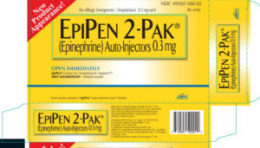


The (Epi)Pen is Mightier Than the Sword
[by Howard Fencl, Hennes Communications] Is it something in the DNA of biopharma CEOs that lights up righteous indignation all over social media and focuses the media spotlight on their self-made crises? Not long ago, I wrote about Turing Pharmaceutical’s 5,000 percent price hike of the toxoplasmosis drug, Daraprim, and the clueless swagger of its pharma-bro ex-CEO, Martin Shkreli.
Now, Mylan CEO Heather Bresch is blaming “the middle man” for a 400 percent price hike for the life-saving EpiPen, an injection device for people with severe allergic reactions. Bresch, the daughter of U.S. Senator Joe Manchin III, is also on the media circuit blaming the government, saying “…Congress and the leaders of this country need to fix this.”
Patients who just a decade ago paid around $60 for an EpiPen two-pack now must shell out $608. But not much about the product has changed since 2009, according to the American Medical Association. When concerned parents took to social media and convinced followers to sign online petitions and sent more than 100,000 letters to Congress, news coverage exploded.
The media immediately framed Ms. Bresch and Mylan as villains, gouging patients – many of them children – and putting lives at risk. Stories reported that her salary curiously climbed along with the price of EpiPen – her paycheck swelled from $2 million to more than $19 million. Reports pointed out her proclivity for commuting in private jets, her false MBA from West Virginia University and her corporate tax dodge merging Mylan with a company in the Netherlands.
If you were in Ms. Bresch’s shoes, what would your message be?
Here is a sampling of the messages she used in media coverage – keeping in mind that her company directed the parade of price increases under her watch:
- “As a mother, the last thing we would ever want is for no one to have their EpiPen due to price.”
- “This is a health care issue. The system incentivizes higher prices.”
- “We have for over 50 years fought for affordable access to medicine…Congress needs to get around the table and fix this.”
The obvious follow-up question to each of these messages is “Then why didn’t you, as CEO, do something about the cost of EpiPen?”
Just because you can charge whatever you want for your product in a free country, there’s a line that can easily be crossed. Someone at Mylan needed to stand up in a meeting at some point in the past decade, and speak truth to power: “We are putting people at risk who have no medical coverage or limited income.” At that point, Ms. Bresch could have put on the brakes, and announced a program to help people afford the drug.
Instead, she waited until public outcry erupted in social media, and delivered this message:
- “Our response has been to take that immediate action of making sure that everyone has an EpiPen.”
But the “immediate” action came only after the public outcry, in the form of a $300 savings card for eligible patients. Ostensibly, this could have come at any time in the past 10 years as the price marched inexorably higher. Is this too little too late for Ms. Bresch’s reputation and for Mylan? Stay tuned.